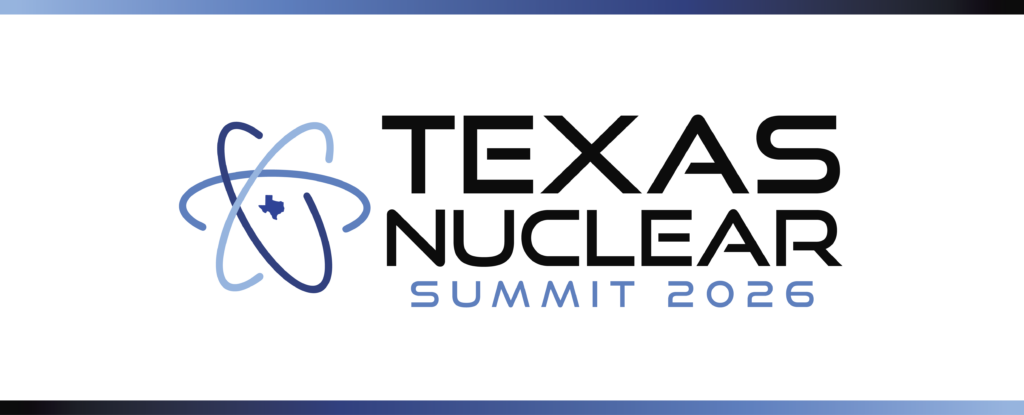“It’s time for Texas to lead a nuclear power renaissance in the United States.”
Governor Greg Abbott
State of the State Address, February 2025

The Largest Nuclear Event in the Energy Capital of the World
September 21-23, 2026
The Post Oak Hotel
Houston Texas
89th Texas Legislative Session: Nuclear Victories
Thank you for your tireless work, advice, insights and support during the 89th Texas Legislative Session. Your engagement—through testimony, outreach, and collaboration—was instrumental in advancing the below pro-nuclear legislation and elevating Texas as a national leader in next-generation energy policy. We’re proud of the progress made and grateful for your continued partnership in shaping a stronger, more secure energy future
Texas Nuclear Alliance Reaches 50-Member Milestone as Texas Positions Itself as the Nation’s Nuclear Leader
AUSTIN, TX (July 3, 2025)—The Texas Nuclear Alliance (TNA), the only industry association in Texas dedicated to the advancement of nuclear technology in the state,

We're thrilled to announce the return of the Texas Nuclear Summit — the must-attend event for anyone passionate about nuclear energy in the Lone Star State. After incredible 2024 and 2025 gatherings in Austin, this year we're heading to Houston, the Energy Capital of the World, for three days of connection, collaboration, and forward momentum.
September 21-23 | Houston
Powering Texas. Empowering the Future with Nuclear Energy.
Texas is experiencing a tremendous increase in electricity demand—with recent Electric Reliability Council of Texas (ERCOT) estimates indicating power demand could reach between 130 and 150 gigawatts by 2030—in large part due to electricity-intensive needs from data centers, AI, the electrification of the Permian Basin and other hard tech manufacturing, such as semiconductors.



Energy Innovation
Texas urgently needs reliable energy solutions to bridge its growing power gap, and nuclear energy stands ready to meet this challenge.
In the past, nuclear energy served as a foundational pillar of Texas’ diversified energy grid, offering a unique set of benefits not offered by other energy sources. As Texas seeks to bolster security, reliability and resiliency of its grid, it should once again look to nuclear energy.
Large-Scale Nuclear
Large-scale nuclear refers to traditional, full-sized nuclear power plants that produce high amounts of electricity—typically 1,000 megawatts (MW) or more—using pressurized water reactors (PWRs) or boiling water reactors (BWRs). Importantly, the process emits no carbon during operation.
SMRs
Small Modular Reactors (SMRs) are being developed to offer clean, reliable, and scalable nuclear energy—especially where large nuclear plants aren’t practical.
Nuclear Fuel Cycle
The nuclear fuel cycle is the series of steps involved in producing, using, and managing nuclear fuel for electricity generation. It includes everything from mining uranium to the final disposal of spent fuel.
Disposal
Nuclear disposal refers to the safe handling, storage, and permanent disposal of radioactive waste generated from nuclear reactors, fuel processing, and other nuclear applications. It’s a critical part of the nuclear fuel cycle and is categorized based on the level of radioactivity:
Uranium Mining
Uranium mining is the process of extracting uranium ore from the ground to be used primarily as fuel for nuclear power plants. Once mined, the uranium is processed and refined into yellowcake (U₃O₈), a concentrated form used for further enrichment and fuel fabrication.
The Facts About Nuclear
Nuclear energy is not a technology of the future—it is proven and operating today. The United States operates 94 commercial nuclear reactors across 28 states, providing approximately 18–20% of U.S. electricity. And Texas is home to the first construction permit for a liquid-fueled advanced reactor, and the first project that aims to deploy grid-scale advanced nuclear reactors at an industrial site in North America.
Nuclear energy technology is:

Reliable:
Nuclear energy has the highest capacity factor of any energy source, producing maximum power more than 92% of the time during the year, making it the most reliable energy source by a wide margin, according to the U.S. Department of Energy.

Secure:
Nuclear energy is a secure form of energy because it is powered by a domestic value chain found right here in Texas. From research, to uranium mining, to advanced reactor development, to construction and long-term operations, every stage of the nuclear lifecycle can be supported by Texas and U.S. companies and workers. This independence strengthens our national and energy security, helping to insulate our grid from global market disruptions or geopolitical instability.

Economic Opportunity:
Expanding nuclear energy will create tens of thousands of high-skilled jobs across engineering, manufacturing, construction, and operations—many of them in rural and economically underserved areas. Investing in nuclear means building American energy, American jobs, and American resilience.

Efficient:
Nuclear generates more power with less land compared to other low-carbon resources we depend on. In fact, nuclear energy has the highest energy density of any widely used power source, meaning it produces vastly more energy from a smaller amount of fuel compared to other technologies. Just one uranium fuel pellet—about the size of a fingertip—contains as much energy as a ton of coal, 149 gallons of oil, or 17,000 cubic feet of natural gas. This exceptional density allows nuclear plants to generate massive amounts of reliable, carbon-free electricity while occupying far less land than wind or solar farms. It also means less fuel needs to be mined, transported, and stored, reducing environmental impacts and improving logistical efficiency.

Resilient:
Nuclear plants are designed to withstand extreme weather conditions like tornadoes, blizzards, hurricanes, floods and power outages, not only protecting them against environmental threats, but also allowing them to provide critical power even under extreme circumstances.

Safe:
According to the U.S. Nuclear Regulatory Commission (NRC), nuclear energy has one of the safest industrial records globally, with extremely low incident rates relative to other forms of energy production. Highly trained personnel, strict federal regulations, and continuous preventative maintenance contribute in part to this success, along with technological advancements. Advanced nuclear reactors use passive cooling systems, eliminating the need for active systems to ensure safe shutdown, making advanced reactors nearly walk-away safe or meltdown-proof.
Upcoming Events
Events Shaping the Future of Nuclear Energy in Texas and Beyond
- September 21-23, 2026
- Houston, TX
2026 Texas Nuclear Summit
- March 13, 2026
- Austin, TX
Nuclear x Texas 2026
Powering Texas' AI Economy
- April 16–18, 2026
- College Station, TX | Texas A&M University
ANS Student Conference 2026 | TNA Partner Event
Don’t Mess with Nuclear: Leading the Way
- December 10, 2025
- Oracle HQ, Austin
2025 Texas Nuclear Summit
The Texas Tech University System Joins the Texas Nuclear Alliance
AUSTIN, Texas (February 24, 2026) – The Texas Nuclear Alliance (TNA) proudly welcomes as a member the Texas Tech University System
NANO Nuclear Energy Joins the Texas Nuclear Alliance
AUSTIN, Texas (February 19, 2026) – The Texas Nuclear Alliance (TNA) proudly welcomes as a member NANO Nuclear Energy Inc., a
Holtec International Joins the Texas Nuclear Alliance
AUSTIN, Texas (February 18, 2026) – The Texas Nuclear Alliance (TNA) proudly welcomes as a member Holtec International, a nuclear energy
Join Our Community Today
Become a part of the Texas Nuclear Alliance and help shape a sustainable future.
